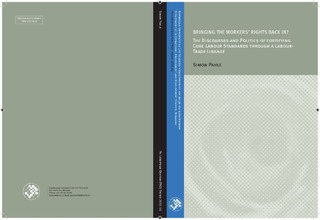| dc.description.abstract | Throughout the 1990s the International Confederation of Free Trade Unions (ICFTU) conducted a campaign to convince states to institute a linkage between the international labour and trade regimes (also dubbed a social clause): Trading rights granted to countries qua members of the World Trade Organisation (WTO) would be made conditional on their compliance with International Labour Organisation (ILO) core labour standards – i.e., their upholding of the rights that enable workers ‘to claim a fair share of the wealth they have helped to generate’. The proposal was premised on the claim that increasing global competition confers commercial advantages on producers that undercut labour standards, and that this incites a regulatory race to the bottom. With a labour-trade linkage, however, such undercutting would become a commercial liability and presumably unleash a race to the acceptable.
While the campaign was the most wide-ranging in the history of the international union movement, it won limited support: Few trade unions or civil society organisations in the developing world rallied behind it, and developing country governments resolutely refused to make the proposal part of the Doha Round negotiations mandate. However, the question is not if the linkage proposal will return to the international debate, but when and on whose terms.
The present thesis explores whether and how a labour-trade linkage may help to tackle the challenges that confront labour in developing countries. In so doing, it privileges the viewpoints of activists in Brazil and South Africa. It furthermore pays particular attention to the challenge of realising agricultural workers’ freedom of association and right to collective bargaining (i.e., ‘trade union rights’) in the two countries.
The study is organised around three key research questions: First, why were certain influential workers’ rights activists lukewarm towards, if not actively opposed to the linkage idea during the 1990s? Second, to what extent are the trade union rights of South African and Brazilian agricultural workers realised, and how may the present situation be accounted for? Third, what would be the properties of a linkage helping to tackle the challenges that confront Brazilian and South African labour, including in agriculture, and to what extent can a linkage thus conceived be accommodated by the international trade and labour regimes?
With regards to the first question, the main finding is that previous attempts at gauging the linkage debate as a showdown between a liberalist and an interventionist discourse ignores that the strength and sources of linkage resistance owed a lot to a pervasive counterhegemonic discourse. This brings into view the principled and practical problems that would follow if labour rights were to be safeguarded by the fair competition logic of WTO.
As to the second question, the study finds that agricultural workers, in Brazil and South Africa alike, do not organise themselves to any considerable extent, nor are they in a position to meaningfully affect the terms and conditions of employment through collective bargaining. However, the respective case studies highlight quite different reasons for such poor trade union rights realisation.
In the case of Brazil, a corporatist labour relations system in conflict with the relevant ILO conventions plays a considerable role: Significantly, legislation prescribes union monopoly representation in predetermined occupational categories, and this forces agricultural wageworkers to share trade unions with smallholders. This ‘cohabitation’ constitutes a significant obstacle to the organisation and collective bargaining of wageworkers.
South Africa’s pluralist labour relations system was borne out of the transition to democracy, is praised by the ILO and trade unionists alike, and the inability of agricultural workers to organise and press collective claims here is not readily attributable to legislation. The fundamental problem relates to enforcement: The system rests on the assumption that progressive labour legislation will suffice to cast rural unions in the role as effective custodians and enforcers of individual workers’ freedom of association. But structural features of the agricultural sector collude with union ineptness to prevent this from happening. When individual workers’ freedom of association is nevertheless taken to be the reserve of trade unions, that freedom is left de facto unprotected.
As regards to the third question, the thesis finds that a linkage helping to tackle the challenges that confront Brazilian and South African labour (i) should be part of a wider internationalist labour compromise that heeds not only the protection of rights but also of jobs in developing countries; (ii) should superimpose ILO rule on WTO (not the opposite); (iii) be premised on the use of targeted and positive trade measures; and (iv) should consider how to give traction to the trade union rights of presently unprotected or unorganised workers. The question of political will of governments notwithstanding, the major obstacles to a labourtrade linkage with such properties reside in the make-up of ILO – not WTO. | nb_NO |

